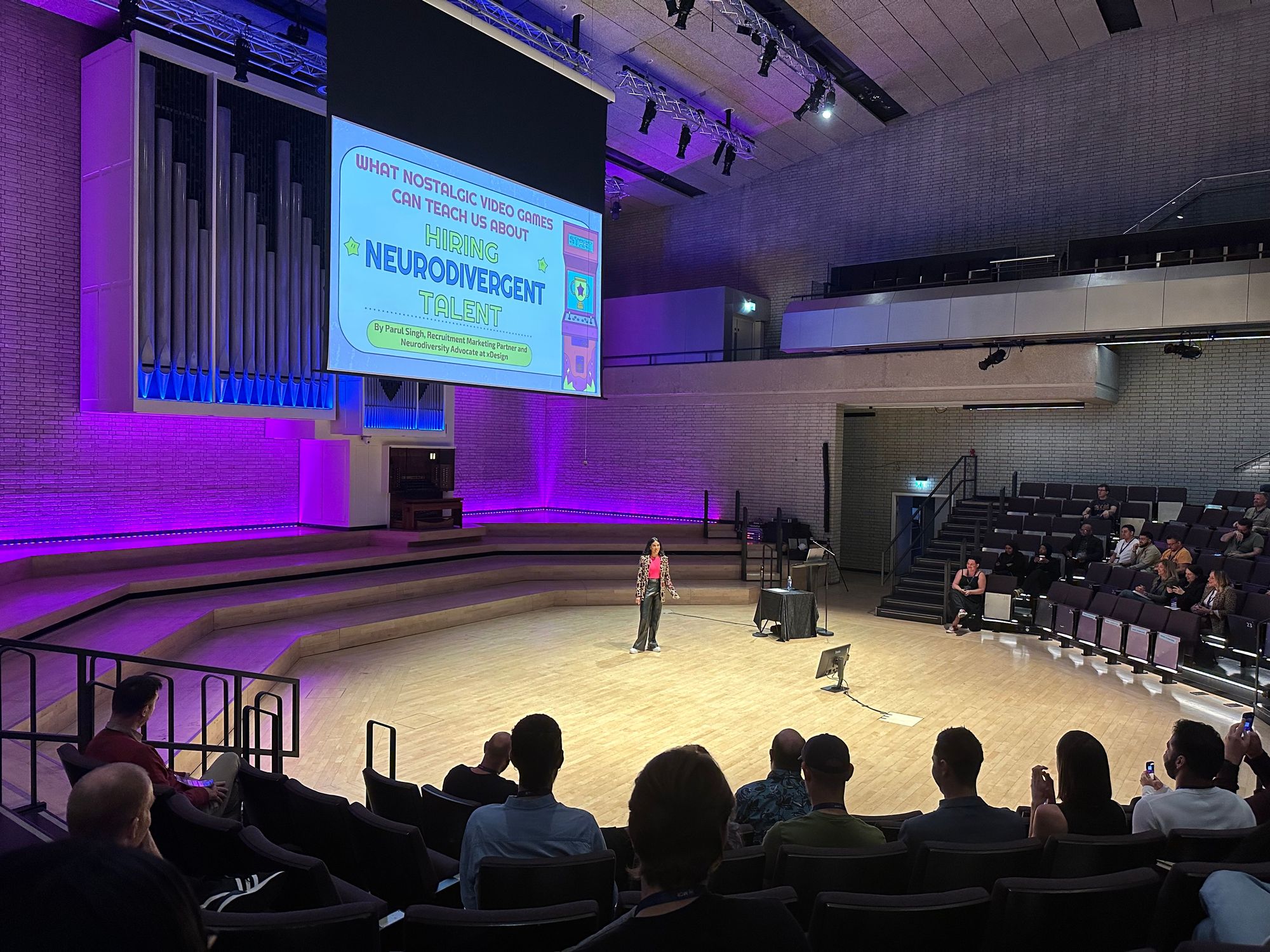What nostalgic video games can teach us about hiring neurodivergent talent @ MCR DevCon 2023

Parul Singh, a Recruitment Marketing Partner at xDesign, took the stage with an intriguing presentation at the MCR DevCon on the topic of neurodivergence in the tech industry. Opening with some stark statistics, she revealed that approximately 15% of the general population is neurodivergent and, within the tech industry, that number surges to a significant 28%. The figure was not just an abstraction for her, as she shared her personal journey of being diagnosed with ADHD two years prior. This revelation established a real-life context and added a deeply personal perspective to her talk.
In an inventive twist, Parul drew on her love for video games to convey her ideas about neurodivergence in a relatable and engaging way. She introduced a slide featuring the four ghosts from the legendary game Pacman, each one symbolizing a type of neurodivergence - ADHD, ASD, Dyslexia, and Tourettes. Pacman, navigating the maze, was labelled as neurotypical, encapsulating the interaction between the neurotypical majority and the neurodivergent individuals.

Parul's points about neurodivergence were not just theoretical musings, as she brought in powerful examples of individuals who turned perceived deficits into assets. A prime example she used was that of Ingvar Kamprad, the founder of IKEA, who was dyslexic. Rather than viewing dyslexia as an impediment, Kamprad found a creative way around it. He chose to name IKEA's products with "real names" instead of impersonal and easily forgettable product codes. This unique approach, born out of his personal struggle with dyslexia, had a twofold advantage. It not only made it easier for Kamprad himself to remember all the products he was selling but also significantly reduced the chances of errors when filling out information on forms. This strategy turned a personal solution into a universal one, as the distinct, real-world names of IKEA products are now universally recognized and celebrated. This real-life example served to underline Parul's argument about the unique problem-solving abilities of neurodivergent individuals, further reiterating the untapped potential they could bring to the tech industry, and indeed, any field.
Parul then nicely segued on to further discuss the strengths and assets that neurodivergent individuals bring to the table. Contrary to common misconceptions, she highlighted that neurodivergent individuals tend to be exceptionally loyal, innovative, and hardworking. Their unique way of thinking can fuel creativity and problem-solving skills, and they can be astute in recognizing patterns. These traits, she argued, are invaluable in a myriad of job roles, particularly within the tech sector.
Despite these strengths, Parul pointed out that the traditional recruitment process often inadvertently marginalizes neurodivergent candidates. Situations like on-the-spot thinking in interviews, which form a core part of conventional recruitment, may pose challenges for these individuals. She cleverly linked the challenges in recruitment to video games, posing the question, "What do video games and hiring have in common?" She drew parallels between the strategy involved in both, the use of "cheat codes," and how both can be perceived as a game.
However, she warned that when the "game" of recruitment is not designed with neurodivergent individuals in mind, they could metaphorically "trip over invisible banana skins," a delightful reference to the popular game Mario Kart. The crux of the issue lies in the unintentional obstacles placed in their path due to a lack of understanding or consideration for their unique challenges and strengths.

Parul introduced the idea of the "Sticky Controller," which perfectly encapsulated the discomfort of being left with a substandard controller while playing a game at a friend's house. This metaphor spoke volumes about the fear neurodivergent individuals often face - the fear of speaking up about their different needs, the fear of being judged, or simply the fear of standing out.
To overcome these issues, she suggested Reasonable Adjustment Programs, a series of adaptations to the traditional recruitment process to make it more inclusive. These adjustments could include allowing candidates more time to complete a task, supplying interview questions beforehand, or changing the interview style to suit the candidate's comfort. A safe space should also be created for candidates to disclose their neurodivergence, to ensure necessary adjustments can be implemented.

One aspect she delved deeper into was the issue of recall that neurodivergent individuals often face. In standard interviews, behavioural questions that require the recall of past experiences might present an obstacle. Therefore, providing such questions in advance could help these individuals prepare better.
The concept of the "T-shaped" hire was discussed using the game Tetris as an analogy. Neurodivergent individuals can bring versatility to various roles within an organization. However, overly specific job adverts might deter them from applying if they perceive themselves as lacking some of the listed skills. Here, Parul stressed the importance of crafting job adverts that accurately highlight the essential skills without excluding potential neurodivergent applicants.
Steve Jobs - Apple
Wrapping up her talk, Parul drew upon Steve Jobs' famous quote about "the crazy ones." She affirmed the immense potential of neurodivergent thinking to bring forth innovation and uniquely solve problems. She concluded with the powerful message that embracing, understanding, and accommodating neurodivergence can pave the way for unleashing untapped talent in the tech industry, and indeed, any field.

